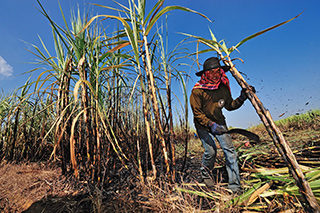Introduction

Kidneys are vital organs that filter waste and toxins from the blood. They are also responsible for regulating the levels of electrolytes in the body and making important hormones that control blood pressure, build red blood cells, and keep bones strong. Chronic kidney disease (CKD) occurs when kidneys are diseased or damaged and no longer able to properly filter blood. Health problems such as heart disease, stroke, or increased occurrence of infections may result.
CKDu
Over the last few decades, a unique epidemic of chronic kidney disease has emerged that cannot be explained by traditional or known risk factors. Referred to here as chronic kidney disease of uncertain (or unknown) origin (CKDu), this disease is also known as Mesoamerican Nephropathy (MeN) or CKD of non-traditional origin (CKDnt).
A devastating public health problem, CKDu is a progressive and fatal loss of kidney function. It occurs in the absence of conditions known to cause kidney disease, like diabetes, heart disease, high blood pressure, and infections.
The disease is found mostly among agricultural workers in hot, humid regions, such as Central America, Sri Lanka, and India. Although the true burden of the disease is challenging to estimate, CKDu has been associated with more than 20,000 deaths in the last five years. With global temperatures rising, agricultural workers who continually face severe heat stress may have increased rates of CKDu.
What is NIEHS Doing?

NIEHS currently funds research to understand how environmental factors, genetics, and other factors are involved in CKDu. In collaboration with other health organizations, NIEHS supported international workshops to bring experts together to discuss current knowledge and future research priorities to advance understanding of this disease.
NTP scientists have helped develop standard approaches to characterize biopsies from kidney tissue, identify key characteristics of the disease, and share perspectives on possible causes.
Studying CKDu could generate insight into an underlying cause of all kidney diseases, and indicate how multiple insults, such as environmental exposures, could have an impact.
Here are a few insights from NIEHS-supported studies:
- Protective effects of hydration – Many sugarcane workers in Guatemala experience acute kidney injury under intense heat conditions. While hydration is important and protective, it did not prevent all injuries.1
- Onset during adolescence – NIEHS-funded researchers measured biomarkers, substances that indicate disease, in the urine of adolescents in different regions of Nicaragua to assess when kidney damage begins. Their results suggest the possibility that kidney damage might emerge during childhood, even before adolescents are exposed to agricultural work.2
- Biomarkers of kidney damage – Urine and blood biomarkers were measured in young sugarcane workers in Nicaragua. Researchers found that job-related heat stress and dehydration may be associated with the development of kidney disease.3
NIEHS-funded, large-scale studies
- Cadmium Exposure and Chronic Kidney Disease in a Rural Population. In a rural Colorado population exposed to cadmium and arsenic, researchers are looking for any associations between people who were exposed to these toxic heavy metals and CKD and possible CKDu cases.
- Etiologic and Mechanistic Factors Underlying Chronic Kidney Disease in Guatemalan Sugarcane Workers. Researchers are studying agricultural workers in Guatemala to identify occupational, environmental, and lifestyle factors that may increase their chance of developing CKDu. They are also working to understand why dehydration, in addition to contact with chemicals known to harm the kidneys, may contribute to CKDu risk.
- Health Effects of Exposures in Agriculture. The Agricultural Health Study is the largest study of farmers and their families in the world. It is funded by NIEHS and the National Cancer Institute, in collaboration with the U.S. Environmental Protection Agency and the National Institute for Occupational Safety and Health. The study examines potential health effects, including with the kidneys, associated with pesticides and other agricultural exposures in about 90,000 people in Iowa and North Carolina.
- Longitudinal Study of Risk Factors for Mesoamerican Nephropathy among Agricultural Workers in El Salvador. A unique epidemic of CKDu disproportionately affects young male agricultural workers in El Salvador. Researchers are investigating the role of exposure to herbicides, heavy metals, and heat stress on the risk of CKDu. This project also aims to identify biological markers of kidney injury that may be useful for early detection and treatment of kidney disease.
- Occupational Heat Exposure and Gene-Environment Interactions in Mesoamerican Nephropathy. Researchers are examining occupational heat exposure in a group of agricultural and non-agricultural workers. They seek to uncover any relationships between heat and kidney injury or function. They are also testing for potential interactions between underlying genetics and environment exposures. The study’s findings will help researchers identify people who have the greatest chance for the disease, which will inform strategies to prevent new cases.
Partnerships
In partnership with the National Science Foundation, the NIEHS Superfund Research Program supported a multi-disciplinary workshop on CKDu in Sri Lanka. The 2016 workshop brought together experts in hydrology, engineering, occupational medicine, social sciences, and environmental health sciences. They developed a framework for understanding different factors that contribute to CKDu risk. In 2017, SRP also sponsored a special symposium on CKDu at the International Conference of the Public Health Foundation of India and the Pacific Basin Consortium.
In June 2018, NIEHS partnered with NIH’s National Institute of Diabetes and Digestive and Kidney Diseases to host a workshop on CKD in Agricultural Communities and address current gaps in knowledge about the disease.
In 2019, NIEHS, with the World Health Organization’s Collaborating Centre for Environmental Health Sciences, co-organized the Third International Workshop on Chronic Kidney Diseases of Uncertain/Non-traditional Etiology in Mesoamerica and Other Regions in San Jose, Costa Rica.4
A report from the workshop (2MB) describes scientific evidence and ongoing research discussed at the meeting. It explains where consensus exists and where questions or different perspectives remain, and it provides specific recommendations for future research on reducing the burden of CKDu.
-
Butler-Dawson J, Krisher L, Yoder H, Dally M, Sorensen C, Johnson RJ, Asensio C, Cruz A, Johnson EC, Carlton EJ, Tenney L, Asturias EJ, Newman LS. 2019. Evaluation of heat stress and cumulative incidence of acute kidney injury in sugarcane workers in Guatemala. Int Arch Occup Environ Health. 92(7):977-990. [Abstract Butler-Dawson J, Krisher L, Yoder H, Dally M, Sorensen C, Johnson RJ, Asensio C, Cruz A, Johnson EC, Carlton EJ, Tenney L, Asturias EJ, Newman LS. 2019. Evaluation of heat stress and cumulative incidence of acute kidney injury in sugarcane workers in Guatemala. Int Arch Occup Environ Health. 92(7):977-990.]
-
RamÃrez-Rubio O, Amador JJ, Kaufman JS, Weiner DE, Parikh CR, Khan U, McClean MD, Laws RL, López-Pilarte D, Friedman DJ, Kupferman J, Brooks DR. 2016. Urine biomarkers of kidney injury among adolescents in Nicaragua, a region affected by an epidemic of chronic kidney disease of unknown aetiology. Nephrol Dial Transplant. (3):424-32. [Abstract RamÃrez-Rubio O, Amador JJ, Kaufman JS, Weiner DE, Parikh CR, Khan U, McClean MD, Laws RL, López-Pilarte D, Friedman DJ, Kupferman J, Brooks DR. 2016. Urine biomarkers of kidney injury among adolescents in Nicaragua, a region affected by an epidemic of chronic kidney disease of unknown aetiology. Nephrol Dial Transplant. (3):424-32.]
-
Laws RL, Brooks DR, Amador JJ, Weiner DE, Kaufman JS, Ramirez-Rubio O, Riefkohl A, Scammell MK, Lopez-Pilarte D, Sanchez JM, Parikh CR, McClean MD. 2016. Biomarkers of Kidney Injury Among Nicaraguan Sugarcane Workers. Am J Kidney Dis 67(2): 209-17. [Abstract Laws RL, Brooks DR, Amador JJ, Weiner DE, Kaufman JS, Ramirez-Rubio O, Riefkohl A, Scammell MK, Lopez-Pilarte D, Sanchez JM, Parikh CR, McClean MD. 2016. Biomarkers of Kidney Injury Among Nicaraguan Sugarcane Workers. Am J Kidney Dis 67(2): 209-17.]
-
Mendley SR, A Levin, R Correa-Rotter, BR Joubert, EA Whelan, B Curwin, EH Koritzinsky, DM Gaughan, PL Kimmel, S Anand, P Ordunez, L Reveiz, DS Rohlman, MK Scammell, RO Wright, RA Star. 2019. Chronic kidney diseases in agricultural communities: report from a workshop. Kidney Intl. 96(5):1071-1076. [Abstract Mendley SR, A Levin, R Correa-Rotter, BR Joubert, EA Whelan, B Curwin, EH Koritzinsky, DM Gaughan, PL Kimmel, S Anand, P Ordunez, L Reveiz, DS Rohlman, MK Scammell, RO Wright, RA Star. 2019. Chronic kidney diseases in agricultural communities: report from a workshop. Kidney Intl. 96(5):1071-1076.]


